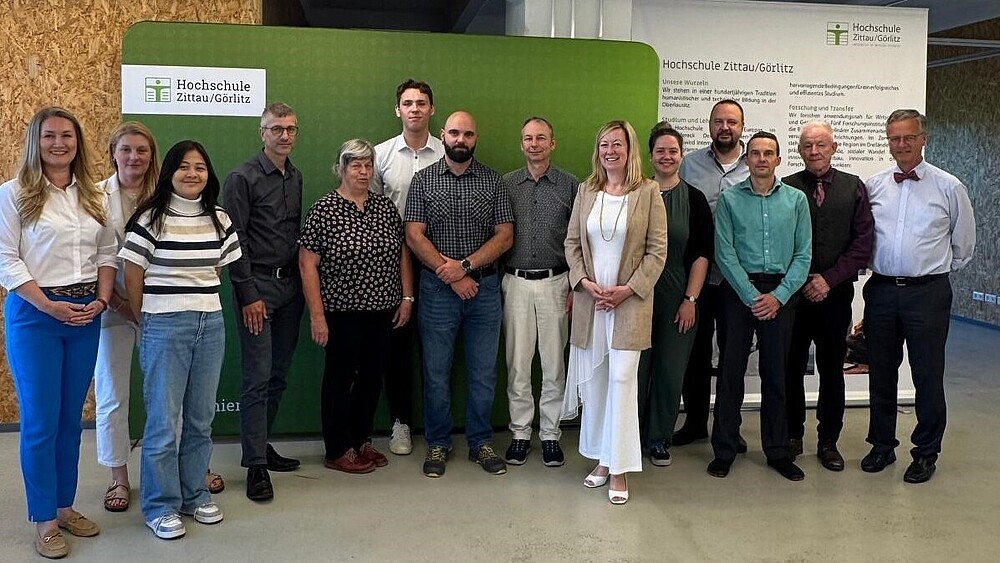Infineon and HSZG are working together as partners for securing skilled workers and innovation to create new courses of study in the semiconductor sector.

On 19 June 2025, Zittau/Görlitz University of Applied Sciences, under the leadership of Prof. Dr Sophia Keil, Vice President for Research, Transfer and International Affairs, invited representatives of Infineon from Dresden to the workshop "HighTech@HSZG meets Infineon Technologies: Partnership for securing skilled workers and innovation" at the Celsiuz Co-Creation Lab in Zittau.
The workshop followed on from the International Business Conference on April 9, 2025, which dealt with the possibilities for increasing the attractiveness of Upper Lusatia as a location for the semiconductor industry, regional supplier potential and securing skilled workers.(Click here for the International Business Conference video.) The current workshop focused specifically on the topic of securing skilled workers - in particular on the further development of dual study formats and the design of new study programs in the semiconductor sector.
The meeting focused on the question of what future-oriented study programs at the HSZG should look like in order to meet the growing demand for skilled workers in the semiconductor industry. Together with Infineon, representatives of the university discussed the content and structure of the planned Semiconductor Processes and Materials Chemistry (B.Sc.) and Mechatronics for Manufacturing (B.Sc.) degree programs, the latter of which is being designed in cooperation with the TU Liberec. The aim is to create practice-oriented curricula that provide young talents with well-founded skills and at the same time enable them to gain practical experience at an early stage.
A particular focus was placed on the cooperative engineering education (KIA) model, which enables a close interlinking of academic training and practical work experience. Other key aspects of the planned partnership with Infineon were also discussed, including the recruitment of specialist lecturers, the expansion of international cooperation and strategies for retaining qualified specialists in the region in the long term.
Our aim is to design study programs that are both practical and scientifically sound and geared towards the specific requirements of industry. The close cooperation with a technology leader such as Infineon is an important step in this direction - not only for our university, but for the entire region.
”Siemens Energy - a long-standing and valued KIA partner of the HSZG - was also among the guests at the workshop. Janek Tiefel, learning process facilitator and training manager at Siemens Energy, and KIA student Martin Alexander Schlemmer provided valuable insights into the practical side of dual training. They reported on successful cooperation models and showed how KIA students can be successfully integrated into day-to-day business life. Martin Alexander Schlemmer gave a particularly impressive account of his personal study and practical experience and made it clear why he would choose the KIA (sandwich-style) degree course at the HSZG again and again. The contributions from Siemens Energy served as a practical source of inspiration for the subsequent discussion with Infineon.
We see the dual study program as an excellent opportunity for future junior staff to gain technological know-how and practical experience at the same time. The HSZG offers excellent conditions for this, particularly with regard to the expansion of semiconductor-specific courses.
”For us at Infineon, it is crucial that we not only train young talent, but also open up prospects for them in the region. With the HSZG, we have a strong partner at our side.
”A special item on the program was the experience report by Alexander Klimmek, KIA student in the field of automation technology in cooperation with Deutsche Bahn. He is currently completing an internship at semiconductor manufacturer TSMC in Taiwan. His perspective impressively demonstrated how international experience, academic training and practical phases can be meaningfully intertwined.
I am particularly impressed by the fact that the HSZG gives me practical and international experience. It is precisely this combination that optimally prepares us for the demands of industry.
”After a tour of the DLR_School_Lab at Zittau/Görlitz University of Applied Sciences, the workshop results were compiled and specific measures agreed. These include
The curriculum adaptations developed in the workshop are to be integrated into the new degree programs, which will start in the winter semester of 2026.
The workshop impressively demonstrated how the university and industry can work together to develop innovative study concepts that respond to both regional needs and international challenges. The planned courses and the intensive collaboration with Infineon will make an important contribution to securing a sustainable supply of skilled workers in the key semiconductor industry - and at the same time strengthen the university's role as a regional driver of innovation. "We see ourselves as a mediator between science and business - and as an active partner in shaping structural change in Upper Lusatia," concludes Prof. Dr. rer. pol. Sophia Keil.
Further formats to deepen the exchange are already planned:
For example, talks with other industry partners such as ESMC (European Semiconductor Manufacturing Company) will take place in fall 2025. The HSZG is thus consistently continuing on its path of developing practical study programs that respond to the dynamic developments in the semiconductor industry - and specifically retain young talent in the region.
Further information can be found on the websites of Infineon Technologies and Siemens Energy.
We would like to thank the representatives of the Faculty of Electrical Engineering and Computer Science - Prof. Dr.-Ing. Klaus ten Hagen, Prof. Dr.-Ing. Wolfgang Kästner and Ondrej Svarc - Prof. Dr. Gerd Fischer from the Faculty of Natural and Environmental Sciences and Nora Terlunen from the Faculty of Mechanical Engineering for their expert input and valuable impulses.
We would also like to thank the representatives of Infineon Technologies and Siemens Energy for the constructive exchange and the KIA students Alexander Klimmek and Martin Alexander Schlemmer for their practical experience reports. We would like to thank all participants for their commitment and their contributions to the successful organization of the workshop.